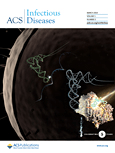
ACS Infectious Diseases
Scope & Guideline
Shaping the Future of Infectious Disease Research
Introduction
Aims and Scopes
- Development of Antimicrobial Agents:
Research on the synthesis, characterization, and evaluation of new antimicrobial agents, including small molecules, peptides, and natural products aimed at combating various drug-resistant pathogens. - Understanding Pathogen-Host Interactions:
Studies that elucidate the mechanisms by which infectious agents interact with host cells, including immune evasion strategies, virulence factors, and the cellular response to infection. - Innovative Therapeutic Strategies:
Exploration of novel therapeutic approaches, including drug repurposing, vaccine development, and immunotherapeutics to enhance the treatment of infectious diseases. - Diagnostics and Detection Technologies:
Research focused on the development of advanced diagnostic tools and methodologies for the detection of infectious agents, including biosensors and molecular assays. - Epidemiology and Public Health Insights:
Investigations into the epidemiology of infectious diseases, including studies on transmission dynamics, outbreak investigations, and the impact of public health interventions. - Mechanisms of Antibiotic Resistance:
Research aimed at understanding the molecular mechanisms underlying antibiotic resistance in various pathogens, with the goal of overcoming resistance through innovative strategies.
Trending and Emerging
- Antimicrobial Resistance Mechanisms and Solutions:
A growing number of studies concentrate on understanding the mechanisms of antimicrobial resistance and developing innovative solutions, including combination therapies and novel adjuvants to restore antibiotic efficacy. - Host-Directed Therapies:
Research increasingly focuses on host-directed therapies that enhance the immune response to infections, revealing new therapeutic pathways that leverage the host's natural defenses. - Nanotechnology in Infectious Disease Treatment:
The application of nanotechnology in drug delivery systems and vaccine development is trending, showcasing innovative approaches to improve efficacy and reduce side effects. - Multi-Disciplinary Approaches to Infectious Diseases:
There is a notable increase in interdisciplinary studies that integrate fields such as genomics, proteomics, and bioinformatics to tackle complex infectious disease challenges. - Focus on Emerging Infectious Diseases:
Research on emerging and re-emerging infectious diseases, including zoonotic infections and those related to climate change, is becoming more prevalent, reflecting the urgent need for new insights in public health.
Declining or Waning
- Traditional Antibiotic Discovery:
The focus on traditional antibiotic discovery methods has waned as researchers increasingly prioritize novel approaches to combat antibiotic resistance, such as the development of adjuvants and alternative therapies. - Single-Pathogen Studies:
Research that solely focuses on individual pathogens is less common, with a growing emphasis on multi-pathogen studies and the role of the microbiome in infectious diseases. - Conventional Vaccination Approaches:
There is a noticeable decline in studies centered on conventional vaccination strategies, as novel platforms such as mRNA vaccines and nanoparticle-based delivery systems gain prominence. - Targeting Well-Characterized Molecular Mechanisms:
Research targeting well-known mechanisms of action in pathogens is diminishing, as attention shifts towards exploring less understood pathways and novel drug targets. - In Vitro Studies without Clinical Relevance:
There is a reduction in studies that do not translate well to clinical settings, as the journal encourages more clinically relevant research that bridges laboratory findings with real-world applications.
Similar Journals

Emerging Microbes & Infections
Connecting researchers to combat emerging microbes.Emerging Microbes & Infections is a premier open access journal, published by Taylor & Francis Ltd since 2012, dedicated to advancing the understanding of microbial infections and their implications in human health. With an impressive Q1 ranking across multiple categories—including Drug Discovery, Epidemiology, Immunology, and Infectious Diseases—this journal is at the forefront of research in the microbiological sciences. Covering a diverse range of topics, it serves as a vital resource for researchers, healthcare professionals, and students alike. The journal's commitment to open access ensures worldwide dissemination of cutting-edge findings, fostering collaboration and innovation in tackling challenges posed by emerging infections. As part of the thriving academic community in the United Kingdom, Emerging Microbes & Infections plays a crucial role in shaping the future of infectious disease research and public health.
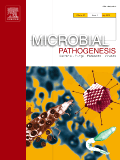
MICROBIAL PATHOGENESIS
Pioneering Research in Microbial PathogenesisMICROBIAL PATHOGENESIS, published by Academic Press Ltd - Elsevier Science Ltd, is a prominent journal in the fields of Infectious Diseases and Microbiology, with a notable impact factor and classified in the Q2 quartile for both categories as of 2023. Since its inception in 1986, this journal has provided a platform for the dissemination of cutting-edge research that enhances our understanding of microbial infections and their implications in health and disease. The journal is indexed in Scopus, ranking #80 among 344 in Infectious Diseases and #57 among 182 in Microbiology, underscoring its significant contribution to the scientific community. Although it operates under a traditional subscription model, the content is vital for researchers, professionals, and students focused on the dynamics of microbial pathogenesis and the development of innovative therapeutic strategies. The journal's comprehensive scope aims to foster advancements in this critical area of study, bridging the gap between laboratory research and clinical applications.

Frontiers in Virology
Connecting Researchers for Global Viral SolutionsFrontiers in Virology, published by FRONTIERS MEDIA SA, is an innovative open-access journal dedicated to advancing the understanding of viral biology, pathogenesis, surveillance, and control strategies. With the rapid evolution of viral threats, this journal serves as a critical platform for researchers, professionals, and students to disseminate and access high-quality research, reviews, and perspectives in virology. The journal places a strong emphasis on interdisciplinary approaches, promoting collaborative efforts that drive breakthroughs in the field. While the specific impact factor and H-index details are currently unavailable, Frontiers in Virology is committed to rigorous peer review and integrity in scientific publishing. Authors and readers will benefit from the extensive reach provided by open access, making groundbreaking insights available to a global audience, thus contributing significantly to the ongoing dialogue in virology and public health.
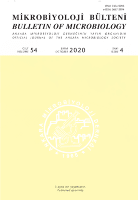
MIKROBIYOLOJI BULTENI
Connecting Researchers in Microbiology and Infectious DiseasesMIKROBIYOLOJI BULTENI, with ISSN 0374-9096, is a prestigious academic journal published by the ANKARA MICROBIOLOGY SOC, located in Ankara, Turkey. Established in 1973, this journal has been a vital conduit for disseminating research in the fields of Immunology, Microbiology, and Infectious Diseases, garnering a reputation as a significant contributor to the scientific community. The journal is currently ranked in the Q3 category within Immunology and Microbiology (miscellaneous), and Infectious Diseases, indicating its impactful presence amidst contemporary research. With access options that may be restricted, MIKROBIYOLOJI BULTENI actively welcomes submissions that advance the understanding of critical microbiological principles and practices, thereby supporting both national and international research efforts. Researchers, professionals, and students are encouraged to explore the latest findings shared in this journal, as it continually shapes the landscape of microbiology and infectious disease studies through its comprehensive and rigorous peer-reviewed publications.
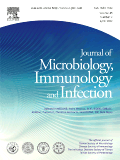
JOURNAL OF MICROBIOLOGY IMMUNOLOGY AND INFECTION
Fostering collaboration in the fight against infections.Welcome to the Journal of Microbiology Immunology and Infection, a premier academic publication established in 1998 and now proudly owned by Elsevier Taiwan. As an Open Access journal since 2016, it provides unrestricted access to groundbreaking research in the fields of immunology, microbiology, and infectious diseases, making it an essential resource for researchers, practitioners, and students alike. The journal holds impressive rankings, including Q1 status in categories such as Infectious Diseases and Microbiology (medical), and a notable 92nd percentile in its Scopus ranking for Medicine - Infectious Diseases. With a dedicated focus on advancing knowledge and fostering collaboration within the scientific community, the Journal of Microbiology Immunology and Infection is committed to publishing high-impact research that significantly influences practice and policy in healthcare and life sciences. The journal is also recognized for its contribution to the ongoing dialogue surrounding contemporary issues in immunology and infection, positioning it as a vital platform for scholarly exchange and innovation.
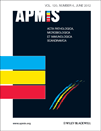
APMIS
Advancing Knowledge at the Intersection of Immunology and MicrobiologyAPMIS is a distinguished academic journal published by WILEY that serves as a vital resource for researchers and practitioners in the fields of Immunology, Allergy, Microbiology, and Pathology. Established in 1988 and continuing its mission through 2024, this journal facilitates the dissemination of high-quality research findings, contributing to the intersection of multiple disciplines within the medical sciences. With an ISSN of 0903-4641 and an E-ISSN of 1600-0463, APMIS is categorized in 2023's Q2 and Q3 quartiles across various domains, reflecting its significant impact, with rankings such as #50/208 in Pathology and Forensic Medicine and #121/233 in Immunology and Allergy. Although it currently does not offer open access options, the journal’s rigorous peer-review process ensures that published articles maintain the highest standards of scholarship. With its focus on innovative research, APMIS continues to occupy a pivotal role for those seeking to advance their expertise and contribute to scientific dialogue in these essential fields.

INFECTION AND IMMUNITY
Exploring the Nexus of Infection and Immune ResponsesINFECTION AND IMMUNITY is a distinguished peer-reviewed journal published by the American Society for Microbiology, focusing on groundbreaking research in the fields of infection, immunology, microbiology, and parasitology. Established in 1971, this journal has built a robust legacy, converging years of scientific discovery with a vision towards 2024 and beyond. With an impressive Impact Factor, the journal holds significant rankings in various categories; its Q1 status in both Infectious Diseases and Parasitology underscores its high relevance and quality within the scientific community. Researchers and professionals alike will benefit from its content, as it promotes the latest advances in understanding immune responses and infectious agents, further legitimizing its place among the top quartiles of its respective fields. Access options are provided through traditional subscription models, ensuring a broad charitable dissemination of knowledge. As a pivotal resource for scholars and practitioners alike, INFECTION AND IMMUNITY stands at the forefront of microbiological and immunological research, fostering essential discourse that is crucial for advancing public health and scientific insight.

Virulence
Pioneering Research for Healthier FuturesVirulence, a leading academic journal published by Taylor & Francis Inc, is dedicated to advancing the understanding of virulence mechanisms in pathogens across various infectious diseases. Since becoming an Open Access publication in 2018, it has broadened the accessibility of cutting-edge research for a global audience, promoting collaboration and knowledge-sharing among researchers, professionals, and students alike. With a significant impact within its field, the journal boasts impressive 2023 quartile rankings: Q2 in Immunology and Q1 in both Infectious Diseases and Microbiology, alongside notable standings in Parasitology. The current Scopus rankings reinforce its prominence, with high percentiles indicating its influence and relevance in advancing scientific inquiry. Covering a period from 2010 to 2024, Virulence serves as an essential platform for innovative research that not only addresses the critical challenges in understanding pathogen behavior but also contributes towards global health solutions, establishing it as a vital resource in the rapidly evolving fields of immunology, microbiology, and parasitology.

Infectious Microbes & Diseases
Unraveling the complexities of microbes and their impact.Infectious Microbes & Diseases, published by Lippincott Williams & Wilkins, is a premier journal dedicated to the exploration and understanding of infectious diseases, microbiology, and epidemiology. With its focused scope and robust peer-review process, the journal aims to disseminate high-quality research that contributes to advancements in the field, making it an essential resource for researchers, healthcare professionals, and students alike. Established in 2019, it has quickly gained recognition, achieving a Q3 rating in categories such as Epidemiology, Infectious Diseases, and Medical Microbiology in 2023, and ranking in the top half of its field within Scopus metrics. Although currently offered as a subscription-based journal, Infectious Microbes & Diseases significantly enriches its disciplines by inviting innovative research and critical review articles, thus playing a vital role in combating the global challenges posed by infectious diseases.

MEDICAL MICROBIOLOGY AND IMMUNOLOGY
Exploring the dynamic world of microorganisms and immune responses.Medical Microbiology and Immunology is a renowned journal published by Springer, serving as a pivotal resource in the fields of microbiology and immunology. Established in 1971 and continuing its legacy through 2024, this journal features cutting-edge research and reviews that address critical advancements and challenges within these dynamic fields. With an impressive impact factor and a robust ranking, including Q1 categories in both Microbiology (medical) and Immunology, it stands at the forefront of scholarly communication, ranking 21st out of 140 in the realm of Medical Microbiology. Researchers and professionals are encouraged to explore a variety of studies that delve into the interactions between microorganisms and the immune system, making it an essential resource for anyone fascinated by these interconnected realms of health sciences. Although not open access, the journal is widely accessible through institutional libraries, ensuring that significant findings reach a global audience. The University of New York Plaza serves as its operational hub in the USA, reinforcing its international influence and dedication to advancing knowledge in microbiology and immunology.